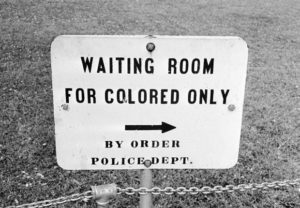There’s a reason why the discriminatory Nuremberg Laws imposed upon German Jews by the Nazi Regime bear a striking resemblance to the segregation laws of America: The Nazis studied them for inspiration.
A new book authored by Yale Law Professor James Q. Whitman details how leading lawyers in Nazi Germany used U.S. race laws to create their notorious race regime and draft what became known as the Nuremberg Laws. The outwardly racist rules excluded Jewish people from German life and took away their rights, much like what the Jim Crow laws of the American South did to African-Americans.
The novel, titled “Hitler’s American Model,” discusses how Nazi policymakers convened in Nuremberg, Germany, to begin laying the groundwork for their new race regime, utilizing American law as a centerpiece for their racist legislation. A rare transcript from that crucial meeting almost 80 years ago reveals that there was lengthy discussion among Nazi leaders about U.S. race laws and their effectiveness.
“At its very opening, the Minister of Justice presented a memorandum on U.S. race law and, as the meeting progressed, the participants turned to the U.S. example repeatedly,” Whitman explained in his book. “They debated whether they should bring Jim Crow segregation to the Third Reich.”

Yale Law professor James Whitman. Image courtesy of Yale Law.
“They engaged in detailed discussion of the statutes from the 30 U.S. states that [criminalized] racially mixed marriages,” he continued. “They reviewed how the various U.S. states determined who counted as a ‘Negro’ or a ‘Mongol,’ and weighed whether they should adopt U.S. techniques in their own approach to determining who counted as a Jew.”
Whitman went on to state that even before the creation of what would become the Nazi Regime, Hitler praised the U.S. in his 1934 book “Mein Kampf” for its success in creating a “healthy racist society.” There were numerous aspects of American democracy that rubbed Nazi leaders the wrong way, but it was the American government’s ability to enforce white supremacy through law that won the German group’s adoration.
“America, which Hitler praised in ‘Mein Kampf’ as ‘the one state’ that had made progress toward the creation of a true racist order, was the global leader in race-based law in the early 20th century, so much so that even the Nazis looked to the USA for inspiration,” Whitman told Atlanta Black Star. So, he said, it was only natural that Nazi Germany would take a few pages out of America’s racist lawmaking book.
In his novel, the Yale law professor also noted that the U.S.’s race-based laws (specifically its immigration laws) not only caught the attention of Hitler and Nazi Germany, but other racists across the globe as well. He discusses how America stood out in the world for its particularly harsh anti-miscegenation laws and legislation that essentially turned African-Americans, Native Americans, Chinese, Japanese and Puerto Ricans into second-class citizens.
“American forms of second-class citizenship were of great interest to Nazi policymakers as they set out to craft their own forms of second-class citizenship for the German Jewry,” Whitman wrote.
German Nazis looked not only to U.S. race laws as sources of inspiration but also to American leaders who preached and actively enforced those discriminatory laws. The Yale professor mentions a Nazi lawyer named Heinrich Krieger who studied at the University of Arkansas as an exchange student in the the early 1900s and touted emancipator Abraham Lincoln and Thomas Jefferson as his heroes.
Whitman pointed to Abraham’s declaration, prior to 1864, that Black Americans should be re-settled elsewhere and Jefferson’s charge that “that the two races, equally free, cannot live in the same government,” as the reasoning behind Krieger’s admiration for the historic figures.
While America’s influence on the creation of Nazi Germany may be a tough pill to swallow for some, Whitman said its a part of both German and U.S. history that must be acknowledged and discussed.
“I hope readers of the book will come away with a deeper appreciation of the extraordinary depth of American legal racism, and its influence even outside our own borders,” he told ABS.



